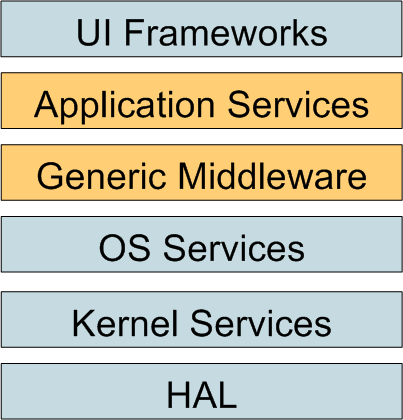PIM Subsystem Overview
Purpose
This document describes storage, organisation and utility functionalities within Symbian platform Personal Information Management (PIM) technology, as defined by its subsystems: Application Engines and Application Services.
Key Concepts
Application Engines - provide PIM data storage and manipulation.
Application Services - provide a collection of utility components.
Application Engines and Application Services enable user applications to acquire, organise, maintain, and retrieve personal information.
Subsystem - a cohesive group of components within a single technology.
Component - the smallest unit of architectural significance and the finest grained unit of description.
Architectural Relationships
PIM Application Services technology delivers high-level OS services for storage and manipulation of user data (such as a collection of Calendar and Contacts items). PIM subsystem components are part of Application Engines and Application Services. The Symbian platform Generic Middleware layer contains the following PIM components: Alarm Server, Time Zone Server and Help Model.
All the components are contained between the OS Services layer and the User Interface layer.
Key clients of these components are licensee applications that use subsystems such as Telephony, SyncML and Messaging.
Application Engines
Application Engines provide data storage and manipulation for user data.
Calendar enables management of calendar entries and provides access to calendar stores. The CalInterimAPI library is the Calendar data store.
The Contacts model provides a unified interface for managing contact information.
Application Services
Application Services are used by multiple application engines or applications running on Symbian.
Alarm Server maintains a queue of system-wide alarms.
Calendar Conversion converts dates between Gregorian and Chinese lunar calendar dates for applications requiring Chinese date support.
Help model manages a collection of files that provide context-sensitive help information.
Notepad API is a middleware tool that you can write simple text to and save for future reference.
The Calendar Interim Utils2 is an Organizer API that provides methods you can use to keep track of your time. It displays the individual days of a given time period. You can add notes and memos to these dates to organize your schedule.
Phonebook APIs provide methods useful in creating a contacts database and performing various operations on it. These APIs expand on the Contact model.
Time zone localization provides localized versions of time zone and city names.
Time zone server allows clients to obtain accurate conversion between any time expressed in UTC and local time for a user's time zone.
Versit is a set of utility classes that support the import and export of data that is formatted according to a set of standards initially defined by the Versit consortium.
There are no strong relationships between any of the subsystem components. They are presented as a subsystem because they enable development of a set of related applications.
Copyright ©2010 Nokia Corporation and/or its subsidiary(-ies).
All rights
reserved. Unless otherwise stated, these materials are provided under the terms of the Eclipse Public License
v1.0.
